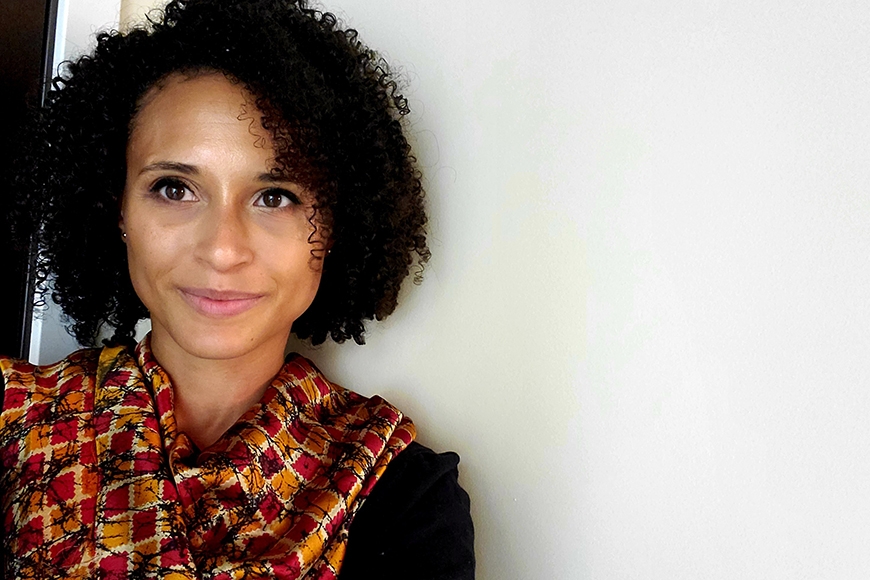Meet Assistant Professor Jessica Horvath Williams
Assistant Professor Jessica Horvath Williams laughs when asked why she chose to specialize in nineteenth-century literature. “The truth is, I liked its books the least,” she says. “My early graduate school logic was, if I work on books that I don't like, then I can remain ‘analytical.’ As it turns out, I was simply reading the wrong things.” Horvath Williams discovered her scholarly focus in the popular fiction of that period. She enjoys teaching “unnerving stories by nineteenth-century women authors” such as Louisa May Alcott, Mary E. Wilkins Freeman, Harriet Prescott Spofford, and Metta Victor. “These works are now lesser known, or unknown,” she notes, “and they deeply unsettle what you think you know about the nineteenth-century US.”
Horvath Willliams earned a PhD in English Literature from UCLA in 2020, and she serves on the leadership team for the Critical Disability Studies Collective at the University of Minnesota. She researches at the intersection of critical disability studies and nineteenth-century US history and literature, with particular emphasis on domestic and slave labor and early eugenicist discourse. Horvath Williams was a President's Postdoctoral Fellow for the Departments of English (2021-2022) and Gender, Women, and Sexuality Studies (2020-2021). Currently she’s working with the Center for Art and Medicine (CFAM) and Twin Cities Public Television (TPT) to create a show on disability, featuring disabled artists in Minnesota. She generously responded to our questions, below.
How did you become interested in disability studies?
Many of us stumble upon the field trying to find conceptual frameworks for experiences we have in the world, or operations within texts, for which we have no language. For me, I found out that I was neurodiverse at the same time I was reading Toni Morrison's The Bluest Eye—a text which features a neurodiverse protagonist. I realized that I didn't know how to talk about myself, that I didn't know how to talk about her, and that there was an ethical dimension to the conversation I wanted to have. So I did what any good researcher would do—I researched. The first book I found was David Mitchell and Sharon Snyder's Narrative Prosthesis, and that was that—I never looked back.
Could you talk more about the project you are researching and writing?
My project, A Monster of Virtues: Female Ideality and the Emergence of Ableism in the Nineteenth-Century US, accounts for another part of disability’s story, foregrounding modern ableism explicitly as a project of whiteness. I trace several stigmas of and correctives for bodymind variability to the idealization of white women in the nineteenth-century US, arguing that many key features of white supremacy, ableism, and disability as a sociopolitical category originate in this ideal. My research investigates how three analytics within critical disability studies—(neo)liberalism and the ideal self as individual responsibility; the absence of futurity for disabled people; and disabled people as non-productive laborers—are rooted in nineteenth-century discourses that surround white women, domestic labor, and health.
What courses have you most enjoyed teaching?
I enjoy teaching courses where I can braid textual and cultural analysis with ethical investigations and skill acquisition (for instance, learning to take productive notes, or creating and using a personal knowledge management system). Whether I'm teaching a course on historical literature, or critical disability studies—or a blend of the two—I focus on how humanities approaches to interpretation (as multiplicity and simultaneity) allow us as readers and people to ethically handle the complexities of modern life.
Advice for current English majors and minors?
We have an enormous amount of data that says that tech, industry, law, and other fields want humanities grads. My advice would be to take internships and practice reframing what we do in literature to be legible to interviewers—to companies that want and need the skills that humanities training provides for investigating problems, finding solutions, navigating multiplicity.
What was the most intriguing piece of writing you've encountered this past year?
I study what was essentially the genre fiction, the pop fiction, of the nineteenth-century US. Ghosts and murder and secret lovers and swooning and, occasionally, pirates. The same is true for the books that I pleasure-read now. Science fiction, fantasy, romance, mystery, adventure—all are welcome—and it is of these books that I find myself asking humanistic questions. For Martha Wells' series The Murderbot Diaries, I thought about the limits of the category of human, the nature of love and obligation, and about the complexities of found family. For Scott Hawkins’ The Library at Mount Char, I was shook for days, wondering, “Do the ends justify the means?” and “What is the cost of revolution?” Rereading Loretta Chase's Lord of Scoundrels, I found myself having to hold both the complexity of its characterizations and its superior focus on communication between romantic partners (and perhaps the most awesome banter ever written) in tension with an ableist side plot. You can dismiss neither, so what are the ethics of reading this book?
Favorite movie or TV show of past year?
Everything Everywhere All at Once. A story that investigates relationality and human connection—paired with absolute absurdity—through the medium of simultaneity, and also laughter? It's as if the Daniels [directors Kwan and Scheiner] reached into my brain, found every narrative craving I have, rolled them together with martial arts and bagels, and then created that film. There has never been a more Jessica story.
Where did you grow up? Is there anything—food, geography, feeling—you miss?
I grew up in Broken Arrow, Oklahoma, and many memories of home are tied to food that was difficult to get either in Los Angeles, where I went to graduate school, or here in Minnesota. Barbecue, fry bread, chicken fried steak, enchiladas de cerdo. Certainly other places have versions of these foods, but there's something about having it prepared in the way you grew up eating it.



